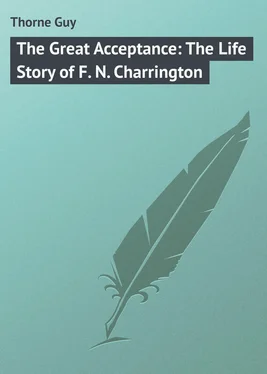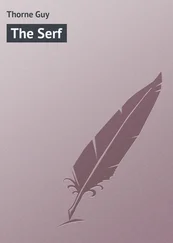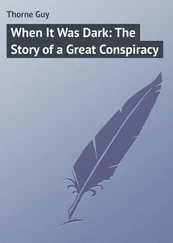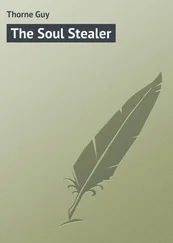Guy Thorne - The Great Acceptance - The Life Story of F. N. Charrington
Здесь есть возможность читать онлайн «Guy Thorne - The Great Acceptance - The Life Story of F. N. Charrington» — ознакомительный отрывок электронной книги совершенно бесплатно, а после прочтения отрывка купить полную версию. В некоторых случаях можно слушать аудио, скачать через торрент в формате fb2 и присутствует краткое содержание. Жанр: foreign_prose, на английском языке. Описание произведения, (предисловие) а так же отзывы посетителей доступны на портале библиотеки ЛибКат.
- Название:The Great Acceptance: The Life Story of F. N. Charrington
- Автор:
- Жанр:
- Год:неизвестен
- ISBN:нет данных
- Рейтинг книги:3 / 5. Голосов: 1
-
Избранное:Добавить в избранное
- Отзывы:
-
Ваша оценка:
- 60
- 1
- 2
- 3
- 4
- 5
The Great Acceptance: The Life Story of F. N. Charrington: краткое содержание, описание и аннотация
Предлагаем к чтению аннотацию, описание, краткое содержание или предисловие (зависит от того, что написал сам автор книги «The Great Acceptance: The Life Story of F. N. Charrington»). Если вы не нашли необходимую информацию о книге — напишите в комментариях, мы постараемся отыскать её.
The Great Acceptance: The Life Story of F. N. Charrington — читать онлайн ознакомительный отрывок
Ниже представлен текст книги, разбитый по страницам. Система сохранения места последней прочитанной страницы, позволяет с удобством читать онлайн бесплатно книгу «The Great Acceptance: The Life Story of F. N. Charrington», без необходимости каждый раз заново искать на чём Вы остановились. Поставьте закладку, и сможете в любой момент перейти на страницу, на которой закончили чтение.
Интервал:
Закладка:
A member of the principal Rescue band, that worked in Bird Fair, wrote —
"One bright Sunday morning we passed down Sclater Street as the fair was commencing. The glad sunlight was flooding the streets, searching every nook and cranny, and putting new life into the caged prisoners, so that they poured forth their hearts in song. A strange contrast, the sweet heavenly music of the country, and the pent-up, confined surroundings presented. At any rate, so it appeared to us; but the 'Fancy,' which was disporting itself in great numbers, clad in a variety of garments, usually with a blue-checked neckcloth, and a short pipe between its teeth, had eyes alone for lark, linnet, or chaffinch, and naught else. The 'Fancy' seemed to repeat itself every way one turned. Here was a man with a cage enveloped in a black handkerchief under his arm, and there another – his counterpart in every particular. They differed only in this, that they were variously laden; one had under his arm a cage, whilst another had a fowl, and another a dog; but cages and dogs seemed to be the most numerous, the former being more in favour than the latter. These men and their cages are inseparable. Walk in the park, they are there; walk into the country, they are there; go to their homes, they are there. Give a man his cage and his pipe, and he is content."
And again —
"The work in Bird Fair is especially interesting. As we entered one of the largest of these houses, we found scores of men congregated in the side-parlour, and as soon as we could distinguish the objects on the other side of the room through the dense clouds of tobacco smoke with which it was filled, we saw that every available mantel-shelf or ledge was filled up with small bird-cages, each containing its little captive. A man just then came into the room, calling out, 'No. 6 and No. 2, are you ready?' from which we conjectured that a raffle or bird club was being carried on. They looked at us somewhat surprised, but civilly received the invitations to be present at the services in Lusby's Music Hall in the evening. We found another house where none but dog fanciers assembled. Ferocious looking bulldogs (carefully muzzled), and delicately reared little pug dogs were seated on their owners' laps, or squatted on the ground at their feet. Here, with the exception of one man whose language was not very choice, we received a kind welcome; and after we had visited the room at the back, the landlord, to our great astonishment, invited us to come round one Sunday evening and talk to the men in the parlour. We almost thought that this was a joke on his part, but on paying him another call on the following Sunday morning and asking him if he really meant what he said, he replied, 'Come to-night.' Accordingly, the same evening we sent off two members of the Rescue band to hold a service at the time appointed. They found a number waiting for their visit, and in a few minutes had forty of these men seated with the landlord in their midst. They talked to them for over an hour of what the Lord had done for them, and what He is willing to do if they would only come to Him. At the close of the meeting there were many requests for them to come again on the following Sunday, and the publican said on leaving that they might come as often as they liked. As they passed the bar, those who had not come into the meeting explained to them which of the bull-dogs would fight, and which would not, etc., etc.; and as they patted the dogs on the head, they got a word with their owners about their own souls."
Support poured in to the multifarious activities of the mission from all sides.
The young Earl and Countess of Aberdeen attended, and were warmly interested. The great Lord Shaftesbury, for many years one of Mr. Charrington's most intimate friends, was also among those highly-placed Englishmen and women who gave their unwavering support.
Mr. Samuel Morley, M.P., has already been mentioned, and one of the richest men in England, Mr. T. A. Denny, was a magnificently generous subscriber, and never ceased in his unflagging patronage of the work. It was Mr. Denny who generously bore nearly all the pecuniary burden of opening a certain East End music hall on Sunday nights – a music hall which will be seen, as the story of Mr. Charrington's career advances, to have had a most extraordinary place and influence in his life.
The music hall crusade was Mr. Charrington's idea, and it proved an inestimable blessing to the population among whom he worked, hundreds being reached there who could never otherwise be brought within the sound of the gospel.
At the Foresters' Music Hall, the famous Evangelist, Mr. Sankey, consented to sing, and for three years the most enthusiastic meetings were held there.
Both the Hon. Jon. Keith-Falconer and Lord Mount-Temple addressed the congregation. One service in this hall was broken up by the loud roarings of some caged lions who were to be shown there on the next night. The audience was terrified and refused to stay, despite Mr. Charrington's assurance that there was no danger. The great beasts were only separated from the Evangelist by the drop curtain, and the experience must certainly have been very unpleasant and nerve-shaking – though Frederick Charrington does not rejoice in "nerves."
Lusby's Music Hall, the place of amusement to which I first referred, and which was the largest music hall in the East End, was opened for several seasons.
Work was begun there on a night in November, 1877. The crowd was so great that it extended beyond the tram-lines, which were seventy feet from the entrance, while before the doors were opened the line itself was invaded, and the police had to regulate the crowd in order to let the trams pass through it.
The hour of this first service was seven o'clock, but at half-past six there was not a single vacant seat in the building, and wherever standing room could be found, it was immediately occupied. Madame Antoinette Stirling came down and sang "O rest in the Lord."
I wish especially to insist on the fact, ample record of which is in my possession, that these music hall services on Sunday nights were continuously crowded. People who would not have even gone into the great tent or the ordinary mission halls were to be found in the transformed haunts of their ignoble week-day pleasures, and the souls that were led to the foot of the Cross were incalculable.
In connection with Lusby's Music Hall, in particular, I cannot refrain from recalling at least one case of very special interest.
A poor man, a dock labourer, who had not attended a service of any kind for several years, entered the hall one Sunday evening when Mr. Joseph Weatherley was the preacher. The sinner's need and the Saviour's power to save him were clearly set before the people, and the man that night rested his soul on the finished work of God. The next day, while at work in the dock, he fell down a ship's hold, and was carried to the London Hospital very much injured. The nurse (a Christian woman), under whose care he was placed, saw that he was dying and spoke to him of Jesus. She found him happy in the assurance of sins forgiven, and on asking how long he had been a child of God, he replied, "Last Sunday night, through the preaching in Lusby's Music Hall." He died rejoicing.
I shall have so much to say of Lusby's Music Hall in a forthcoming part of this book that I will not attempt, in this place, any word-picture of the services there.
In connection with another establishment of the same kind, and, if possible, much lower and more disreputable than the usual thing, I am able to reconstruct a typical scene of the many that occurred there when Mr. Charrington and his friends turned it for one night in each week from a place of sin and corruption to a stronghold of our Lord.
Wilton's Music Hall, or, as it was affectionately called by its habitués, "The Mahogany Bar," was a music hall opening on a quiet square notorious as the Ratcliff Highway, then regarded as the most disreputable street of its kind in the whole world. Ratcliff Highway – has it not obtained an evil immortality in the words of innumerable songs which are minor classics in their way? – was the resort of the lowest characters of all nations, the very scum of the earth. It was here that "Poor Jack" fell a prey to the vilest harpies in Christendom, it was a den of prostitution, vice, drunkenness and crime, tenanted by fiends in human form, who made their unholy gains out of the passionate outbursts of the misguided sailors, who, by their orgies, their desperate affrays, and frightful excesses, did so much to confer its evil notoriety upon the street.
Читать дальшеИнтервал:
Закладка:
Похожие книги на «The Great Acceptance: The Life Story of F. N. Charrington»
Представляем Вашему вниманию похожие книги на «The Great Acceptance: The Life Story of F. N. Charrington» списком для выбора. Мы отобрали схожую по названию и смыслу литературу в надежде предоставить читателям больше вариантов отыскать новые, интересные, ещё непрочитанные произведения.
Обсуждение, отзывы о книге «The Great Acceptance: The Life Story of F. N. Charrington» и просто собственные мнения читателей. Оставьте ваши комментарии, напишите, что Вы думаете о произведении, его смысле или главных героях. Укажите что конкретно понравилось, а что нет, и почему Вы так считаете.












